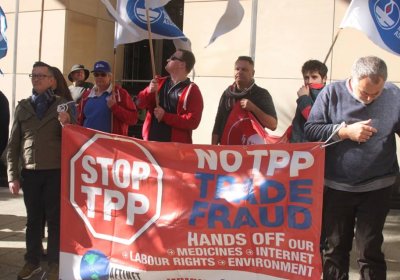A polluting gold mine in central Thailand, owned by Australian company Kingsgate that was closed by the government, has been allowed to reopen, reports Tim Ginty.
free trade agreements
More and more US transnationals have opened up in Mexico over the past few decades, taking advantage of unfair trade agreements, super-exploitative labour conditions and cheap utilities, reports Tamara Pearson.
More than 100 members of unions, aid and development organisations, health, environment and other groups rallied in Sydney on June 15 outside the Federal Parliament's Joint Standing Committee public hearing on the controversial Trans-Pacific Partnership (TPP)-11 trade agreement. The rally was organised by the Australian Fair Trade and Investment Network (AFTINET).
With the release of the full text of the Comprehensive and Progressive Agreement for Trans-Pacific Partnership (CPTPP) on February 21, activists in the 11 signatory countries finally got to see if their worst fears of a corporate power grab would be confirmed.
Unfortunately, they mostly were.
A final version of the Trans-Pacific Partnership (TPP) free trade deal, which will reduce tariffs and other trade barriers between 11 countries in Asia and Latin America that amount to 13% of global GDP, was released on February 21.
The Association for the Taxation of Financial Transactions (ATTAC) is an international movement for social, environmental and democratic alternatives that organises against free trade policies that grant huge powers to corporations at the expense of people and the planet.
There is money to be made in farming, but not by the farmers.
The terms of trade for farmers continually declines and farmers are forced off the land. Governments and international bodies advocate further deregulation and trade liberalisation and greater use of technology. But these policies have undoubtedly failed in their stated aims of increasing food security and rural prosperity. The beneficiaries have been only agribusiness corporations.






